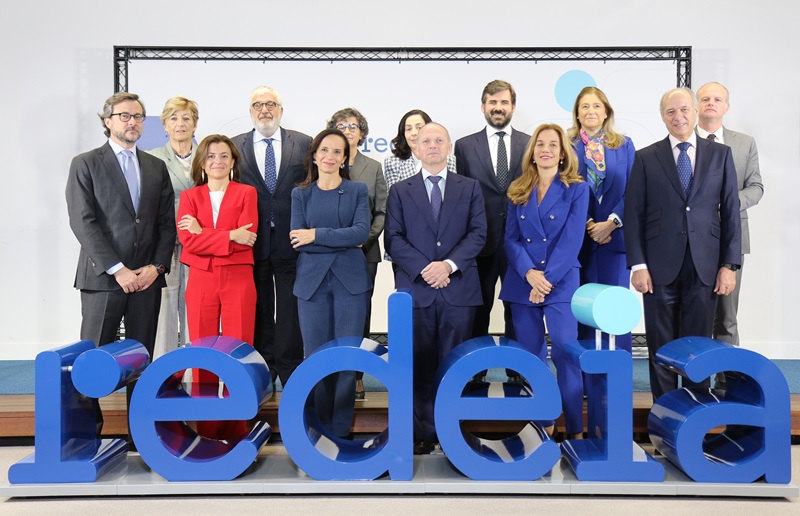We are a global operator of essential infrastructure
- The project to recover Posidonia oceanica in Majorca, promoted by Redeia —through Red Eléctrica— in collaboration with IMEDEA and the Balearic Government, has been awarded the 10th Anniversary All-Star Award.
- The Renewables Grid Initiative (RGI) has recognised this Redeia initiative as an example of the "opportunities and successes of research-driven restoration".

The Redeia Marine Forest, a pioneering project that has restored two hectares of Posidonia oceanica meadows in Majorca, has been awarded the 10th Anniversary All-Star Award by the Renewables Grid Initiative (RGI). As such, it has been recognised as the best practice implemented in European electricity transmission grids over the last decade.
The RGI, an umbrella organisation of NGOs and TSOs which promotes the integration of renewable energy and biodiversity, organises the annual Good Practice of the Year awards to celebrate good practices in European electricity systems. A panel composed of senior European Commission officials and academics is responsible for examining the projects nominated for the awards. This year, on the 10th anniversary of the awards, a new category has been added to select the best among the winners of their previous 10 editions. The Marine Forest, which won an award in 2017 for best practice that year, stood out among other candidates as it is an example of the "opportunities and successes of research-driven restoration."
The project, which is the result of the collaboration between Redeia (through Red Eléctrica), the Mediterranean Institute for Advanced Studies (IMEDEA), the Balearic Islands Government, and the Pollença military aerodrome, has succeeded in restoring two hectares of Posidonia seagrass meadows in the Balearic Islands, an ecosystem on which more than 700 species depend. This commitment to the future has made it possible to develop a technique for the recovery of marine environments with this aquatic plant, which is endemic to the Mediterranean and plays an essential role in the fight against climate change.
"This project clearly proves that companies such as Redeia can and must generate a positive impact wherever we operate", stated Eva Pagán, corporate director of Sustainability at Redeia. "We are very proud to be recognised for the outstanding value of this initiative, through which we are contributing to the protection of this key ecosystem for the biodiversity of the Mediterranean and the fight against climate change. It perfectly illustrates Redeia's vision to ensure that its infrastructures succeed in creating networks of life”. Eva Pagán accepted the award at the fourth edition of PCI Days, organised by the European Commission in the presence of the Director General for Energy, Ditte Juul-Jorgensen.
Posidonia oceanica, the Mediterranean tool for combating climate change
The Marine Forest is a project linked to the development of infrastructures that came about in 2012 as the result of Redeia's commitment to ensuring that the Mallorca-Ibiza submarine cable would help with the regeneration of Posidonia oceanica meadows. This plant species is essential for the preservation of aquatic ecosystems, as it is an organic carbon reservoir. This means that it is a plant with great potential in the fight against climate change, against the degradation of marine ecosystems, and for the promotion of the energy transition.
The initiative originally focused on both ends of the Majorca-Ibiza submarine electricity connection, specifically in the bays of Santa Ponça (Majorca) and Talamanca (Ibiza). During the experimental phase of the project, seeds and fragments of Posidonia were collected for cultivation in laboratory conditions and subsequently replanted in the two bays. Following positive survival results achieved in these first plantings, 12,800 fragments of this plant were planted in the bay of Pollença in 2018, creating the first underwater forest of this size in the Mediterranean.
Monitoring of the planting carried out in 2023 shows that the survival rate of the planted Posidonia fragments remains above 92.3%. Building on the success of the project, Redeia is continuing to look for allies and analysing opportunities to extend this initiative to other areas of the Mediterranean.
Projects with recognised value
The 10th Anniversary All-Star Award highlights the exceptional and pioneering nature of this initiative, which has been honoured on several occasions since its launch. In 2018, it won the European Business Award for the Environment in the Business and Biodiversity category, while in 2019 it won one of the Cinco Días Awards for Business Innovation.
Additionally, this year the RGI has made special mention to another of our projects included in its catalogue of good practices for the year. This is the initiative linked to the installation of the underwater connection between Lanzarote and Fuerteventura, including its protection with an environmentally-friendly concrete produced by ECOncrete which promotes the regeneration of marine life.
The two projects mentioned above are not the only ones to have won awards at the Good Practice of the Year Awards. Last year, the panel of judges gave an award to the “Bio Transport” research project developed together with the Spanish National Research Council (CSIC), which demonstrates the Spanish electricity transmission grid's ability to support the creation of new habitats for certain animal species as a survival mechanism in the face of global warming.












